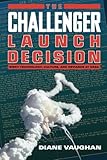Found in 3 comments on Hacker News
msl · 2015-01-30
· Original
thread
There is a write up about the development of the STS-software[1]. If memory serves, the key is specifying everything extremely rigorously. It seems to me though, that writing such specification (if sensor A detects such-and-such value and sensor B...) would share most of the problems writing actual software does.
Another look at how to get "NASA like" confidence is provided by Richard Feynman[2] and Diane Vaughan[3].
[1] http://www.fastcompany.com/28121/they-write-right-stuff [2] http://science.ksc.nasa.gov/shuttle/missions/51-l/docs/roger... [3] http://www.amazon.com/The-Challenger-Launch-Decision-Technol...
RohanAlexander · 2015-01-28
· Original
thread
I recently read 'The Challenger Launch Decision' by Diane Vaughan [0]. It looks at the organizational structure that led to the Challenger disaster. If you're interested in learning more about the background to the launch, and the lessons for any complex project, then it's well worth reading.
[0] http://www.amazon.com/The-Challenger-Launch-Decision-Technol...


Sometimes when you get harsh feedback it has to do with (1) you, (2) people like you, (3) what somebody imagines you are.
I'd point to the idea of "weak signals" from
https://www.amazon.com/Challenger-Launch-Decision-Technology...
Roughly that organizations that are sensitive to weak signals have some protection from dangerous situations. I could ask, for instance, "Why is Amazon still here but K-Mart isn't?" and I'd answer: "There was that time I went shopping for new numbers from my mailbox and K-Mart had only a 4 and a 7 but not a 2".
I walked out buying none of the numbers and never gave anyone at K-Mart feedback about it because I didn't think anyone cared, that anyone was empowered to do anything about it. Had I brought it up I imagine they would have made some excuse along the lines "2 out of 3 ain't bad".
Given that K-Mart wasn't sensitive to weak signals I imagine the only person who would give feedback was somebody feeling hostile and sadistic who mainly wanted to raise the blood pressure of the manager. The one way you'd think you could make a difference by talking to them is by causing so much distress you could force somebody to quit and at least that person would get a job at an organization that could better use their talent.
Thus if you really have a culture which isn't sensitive to mild feedback the only feedback you're going to get is from people who "lose their shit."